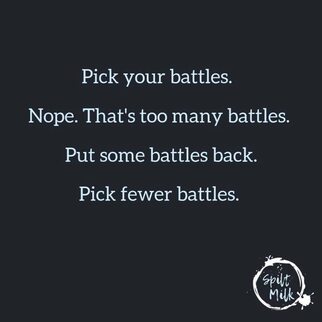
You are trying to get your message across, but they just won’t hear it! For some reason they are making these bad choices or engaging in these harmful behaviors and we just cannot get them to stop!
We come from a good place, we love them, and only want them to be successful, but they just cannot see it. What they hear is that they are not good enough, that we want them to be perfect, or miserable, and that we are old and couldn’t possibly understand.
The truth is, that despite being really old, we do understand. Many of us have been there and made similar mistakes. Many of us remember all too well the excitement of new romantic relationships, the need to escape and relax with drugs or alcohol, and the fun of being out past midnight. But we also remember the problems that came with some of those choices and we so desperately want good futures for our kids.
Personally, I got into fostering because I was willing to sacrifice my home, my privacy, my money, my time all so they could have a better life! And unfortunately this passion crowds into my attempts at communication. And if you are like me, we end up damaging our relationships with our teens, when we were only trying to love them and get them to stop doing stupid stuff.
So for today, I am going to offer three tips to help you slow down, improve your communication and better your relationship with your teen. Grab a glass of iced tea, take a deep breath, and consider these ideas as you walk the journey of parenting tweens & teens. I am in it with you, and I don’t always do it well. But here are our parenting goals and maybe they can help you out a bit today.
1. Choose your battles
There is just too much going on. If you try to fight with your teens on every battle that comes in your home, you will never have time to connect. So you will need to choose what you really need to address. With clients I often refer to these as, “intolerable behaviors”. These are the things you cannot let go of either because they are safety concerns or serious values violations. Pick a few, maybe 2 or 3, and those are the battles you will fight. This might mean that you ignore the towels all over the bathroom floor, or the revolting smell wafting out of their bedroom, you might ignore missing homework assignments, you might ignore how much time they spend sleeping or how saggy their pants are.
Take some time and journal all the battles with your teen that you are currently fighting or thinking about fighting. Then start crossing off items on that list. Seriously. Put some battles back. You physically & emotionally cannot fight them all. Narrow your list down until you get to the few that you really need to fight.
I know I know! You are now freaking out about all the battles you put back. I know your in laws will raise their eyebrows. I know your neighbors would disagree. I know some of these will be really difficult to let go of. But if you want to make some progress, you need to be more strategic with the resources you have. You only have so much time and energy for each teen in your home.
Ok, I hear you. Stay with me, before I go on, let’s briefly talk about what do you do with the ones you put back.
2. Natural consequences
For many of our teen’s problems, natural consequences will address the situation without your help. If your teen chooses to not wear a winter coat, because hoodies are cooler… they will be cold. And that is ok. If your teen chooses not to brush their teeth… others will tell them their breath stinks, no one will want to kiss them, and the dentist will tell them they need fillings. And that is ok. For many of the battles that you are putting to the side there will be other consequences. Their school will get on their case, their friends will bug them, there will be other ripple effects of their behavior that will also motivate them to change. And sometimes, those motivators are more powerful that you and I. So let it play out, and see what happens without your nagging.
I’m serious. You can put these problems on the back burner for awhile. It doesn’t mean you will never address them, but it does mean that you will let it play out for a season while you deal with the more critical issues. You will allow them to be uncomfortable, you will allow them to be hungry at lunch time because they forgot to pack food for school, or you will watch them get fired from their job because they always arrive late for work. These are natural consequences that you will sit back and watch happen to your teen, so that they can learn from real life discomfort.
3. Trust Based Relational Interventions
Next, let’s look at those battles you didn’t put back. The ones that scare you, keep you up at night. The ones that you are hanging on to and need addressed yesterday. For these behaviors TBRI recommends two strategies.
First, take some time to connect with your child and discuss what is going on with them that is causing the issue. In a calm moment check in and hear them out. Literally today we are addressing this in our home with some father-son time at Steak n Shake tonight. They are going out to sit down and discuss some issues in our home. It is a public place so everyone will remain calm, they have food my kid likes, and there will be lots of distractions in the room to help with the tension. Although it seems rewarding to buy your kid a milkshake, it is a way for us to connect and address these issues in a safe space.
Unsure how to have this kind of conversation with your teen? If you are looking for a deeper dive and some scripts for how to do this with your tween or teen I would recommend checking out Collaborative Problem Solving. The Collaborative Problem Solving (CPS) Institute was established in 2002 at the Department of Psychiatry at Massachusetts General Hospital and under the direction of Dr. Ross Greene and Dr. Stuart Ablon who have now gone on to develop this theory further and are very active using it in homes, hospitals, school & correctional systems.
In these “time-in” moments, spend most of the conversation listening to their side of the story and discovering their motivation for this troubling behavior. Be curious to find out if there is a skill deficit you can coach them on to help them reduce the behavior. For example, if they are using drugs or alcohol, is it because they are escaping pain, are they self medicating depression or anxiety, and do they need support to learn how to manage emotions without substances? If they are missing curfew is it because they don’t feel connected to you, or is it impulsivity, or poor time management and planning skills? When you take the time to help them work on the problem, you will gain empathy and a strategy to coach them on how to become more successful.
You can determine if this is coaching that you can do as their parent, or if you will need professional help. A lot of the time you will discover skills deficits that you are able to work on. You can help them connect to you, you can create new home strategies to empower them to become more successful, you can set up some parent-teen times during the month where you can coach them on these necessary life skills.
You will notice I am not talking about punishments. I am talking about addressing missing skills. For many of our kids they are not going to respond well to traditional consequences. In our home we have had some teens that followed a grounding, but others (who were much bigger than me!) would just walk out the door anyway. So that isn’t going to work. It is going to make you life harder and is going to push them further away from you.
I am talking about shaping behavior. I am talking about looking for the root issue of the behavior and attempting to address that, to connect with the teen, to give them a reason to make a different choice and to teach them a better way.
I’m not saying this is easy. I’m not saying you will get to the root of the problem in your first attempt at the conversation. But I am saying that when you are only focusing on a couple of issues and you demonstrate a desire to help them, over time they are more likely to respond. Your length of relationship with the teen, and your level of attachment with them, will play into how tough this will be for you. We have teens that came to us having lived a long time with their bio family and they still connect with them on social media and have visits with their family monthly. This absolutely impacts our ability to be an authority figure in their world. However, we do the best we can each day to empower them to break the cycle and be successful. Don’t give up with the first shoulder shrug and “I don’t care”. Stay connected and consistent, demonstrating your desire to help them learn the skills they need to rise above their past.
Let me say this again, it isn’t going to be easy. Parenting teens is tough for the best of us, and then when you add tough pasts into the mix it becomes even more difficult. But remember your why. Remember why you got into this in the first place. Your consistent patience and love for your teen will go a lot further in shaping their behavior than any lecture or punishment.
Secondly, when they do engage in the intolerable behaviors, TBRI will encourage you to respond in an IDEAL manner.
- Immediate - within 3 seconds. Don’t wait days to interact with your teen. But attend to the intolerable behavior immediately so they see the connection between the behavior and its effects.
- Direct - within 3 feet. Don’t yell at them from another room. Get close. When you are addressing intolerable behaviors you should be within 3 feet of your teen in order for them to truly hear what you are saying.
- Efficient - no lectures. “I love it when my parents preach at me” said no teen ever. Keep your engagement simple. Less than 30 seconds. You are labeling the behavior and why it is intolerable. The end.
- Action based - Redos. If appropriate, quickly give your teen a chance to redo the behavior with a better choice. Now, for some things, like curfew violations, substance abuse, etc this is not possible. But whenever possible give your teen a chance to think through what they just did and graciously offer them a second chance to get it right. They may or may not take you up on it, but as you consistently offer them this opportunity they will be reminded that you offer second chances and you may see a change in the future.
- Level your conversation at the behavior, not the teen. When you are addressing your teen, make sure you are not referring to them as the behavior. What I mean is, if they are lying you don’t call them a “liar”. If they are abusing substances, you don’t call them a “druggie”. If you want to stay connected to your teen you want to keep your conversation in a place where they clearly understand that you love them, but cannot tolerate the behavior. This can be very difficult when you are emotional so you might want to refer back to #3.
Again, this is IDEAL. It may not always be realistic with your energy level and your teen’s ability to participate. But this is our goal. To be honest, when our teen came home at 4am, for so many reasons, it was not a good idea for me to be within 3 feet of him within 3 seconds. So we made a decision to address it later. You may have been able to do it. I was not. But by adapting these principles to your family, you can make a difference.
My encouragement to you is to take a look at these items and see where you think you could be more strategic with your parenting. How can you stay connected, continue to empower your teen and work to correct their behaviors? Perhaps by taking a few of these suggestions and implementing them in your home this week it will make a difference. You will never know until you try! And just like Love Moves Us has been saying. Don’t just try it one or two times. It won’t work. But give it 90 days. Pick something that you are willing to change and really commit to changing your parenting strategy by correcting your teen in a new way, every day, for 90 days. Life won’t be perfect. But it will be better.
AuthorFor the past eight years Trish has been a foster parent to a group of 7 brothers and sisters, with her best friend, Roy. They are both child therapists, but inviting this family into their home was a whole new world! She wrote / narrated a book about their journey, The Call to Love. It is available on Amazon, Audible & iTunes. She has a Masters in Counseling Psychology, and she is an LCPC in Illinois with a certification in the treatment of child trauma (AAETS). Check out her website at www.trishjonker.com to read her blog, for more information on her book or to schedule parent coaching sessions for yourself. |


 RSS Feed
RSS Feed